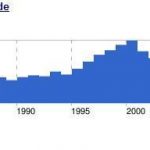Finding the Human in “the messy, contingent, emergent mix of the material world”: Embodiment, Place, and Materiality in Stacy Alaimo’s Bodily Natures
Veronica VoldIn this review Veronica Vold charts the posthuman environmental ethic in Stacy Alaimo's Bodily Natures: Science, Environment, and the Material Self and notes how the text draws together issues of race, (dis)ability, and the environment in a way that disrupts the boundaries between bodies and places.
Late Light in the House of Sounds: Joseph McElroy’s Night Soul and Other Stories
Gregg BiglieriGregg Biglieri offers some advice on reading McElroy: jettison one's habitual grammars and adopt the grammars of time and timing. Become an expert in sound. Become all ear.
In Praise of “In Praise of Overreading”
Clint BurnhamIs 'overinterpretation' good or bad? Is it even possible, and is it ever enough? (Or are we reading too much into this?) Clint Burnham shadows Colin Davis as he traces the interventions of a "wild bunch" of critics, theorists, and philosophers, who grapple with the question of what counts as a reading of a literary text.
Hysteria and Democracy: Exfoliating Difference in Lynne Tillman’s American Genius, A Comedy
Maureen CurtinCiting the narrator's radical ambivalence about time, history, and the flesh, Maureen Curtin argues that American Genius, A Comedy represents the hysteria of the contemporary "post-political" moment.
How to Write the Present Without Irony: Immanent Critique in Lynne Tillman’s American Genius, A Comedy
Sue-Im LeeContrasting Lynne Tillman's text with the "complicitous critique" of Donald Barthelme and other postmodern ironists, Sue-Im Lee argues that Tillman's narration displays the "mobility" of Adornian cultural criticism, in which contradiction is not a problem but a mode of interrogating the present.
Lynne Tillman and the Great American Novel
Kasia BoddyMost recent "Great American Novels" are not great, but merely big. Lynne Tillman's American Genius, A Comedy, by contrast, is designed with scale, not size, in mind. So argues Kasia Boddy, who reads the novel as a critical engagement with book reviewers' favorite cliché for ambitious social fiction. Instead of resisting cultural obsolescence through sheer assertion, Tillman's book examines how the cracks and contradictions of American ideology have imprinted themselves on the individual body, bearer of the national disease: sensitivity.
Skin Deep: Lynne Tillman’s American Genius, A Comedy
Peter Nicholls"Like skin, the comma both connects and divides." Peter Nicholls traces Tillman's endlessly subordinating, endlessly equivocating sentences, showing how their quest for historical and social clarity passes through an interminable sequence of deferral and denial.
Post-Prognostics
Justin RobyHow does one write science fiction when the atom bomb (and later 9/11) makes the future seem impossible to predict? Justin Roby reviews Paul Youngquist's Cyberfiction: After the Future, which explores how postwar "cy-fi" critiqued life in the age of cybernetic control systems.
Going Up, Falling Down
Tom LeClairCan the rising cost of cosmopolitan real estate have brought the New York City novel to a low point? Tom LeClair measures recent fictions from and about New York City - including three "9/11 novels" - against the Systems Novel of the mid-1970s.
